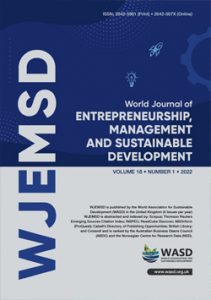Institutions and entrepreneurship: the mediating role of corruption, Mohsen Khyareh
 Mohsen Mohammadi Khyareh
Mohsen Mohammadi Khyareh
Gonbad Kavous University, Gonbad-e Kavous
Iran
Email: m.mohamadi@ut.ac.ir
DOI: 10.1108/WJEMSD-09-2016-0045
Purpose: The purpose of this paper is to examine the mediating role of corruption in the relationship between entrepreneurship and institutional quality in a sample of 90 countries from all around the world.
Design/methodology/approach: The data were collected from the Global Entrepreneurship Monitor, which developed a model where Corruption Perception Index as a proxy for corruption mediates the relationship between the variable rule of law as a proxy for institutional quality and opportunity entrepreneurship as a proxy for productive entrepreneurship. Correlation, Baron and Kenny approach (causal steps approach) and PROCESS Macro (normal test theory) developed by Hayes were used to find out the direct and indirect effects of institutional quality between corruption and entrepreneurship.
Findings: The bootstrap mediation results indicated that institutional quality was a significant predictor of corruption and corruption was a significant predictor of entrepreneurship. These findings support the mediation hypothesis. In addition, findings showed that there is a negative relation between corruption and productive entrepreneurship and a positive relation between institutional quality and productive entrepreneurship.
Research limitations/implications: The current study only considered the single proxy for institutional quality, i.e. rule of law; therefore, some other proxies for institutional quality such as government effectiveness and doing business can be used for future studies. Moreover, the proposed model does not control for the country differences like GDP or development stages of countries.
Practical implications: The findings of this study indicate that the total association between institutional quality and entrepreneurship is not only direct but also that rule of law contributes to levels of entrepreneurship through reduced levels of corruption. As a result, countries with higher levels of rule of law tended to experience corruption at lower levels, which in turn contributed to the emergence of increased levels of entrepreneurship. Furthermore, these results may be beneficial for organizations fighting against corruption, because entrepreneurial activity can be add to the group of economical drivers constrained by corruption. It is also beneficial for policy makers who focus on promoting entrepreneurship, since one way to increase entrepreneurial activity is to lower the existing corruption level.
Originality/value: The results indicated that the direct effect of institutional quality on the entrepreneurship remained significant when controlling for corruption, thus suggesting partial mediation. In other words, corruption only mediates part of the effect of institutional quality on entrepreneurship, that is, the intervention (institutional quality) has some residual direct effect even after the mediator (corruption) was introduced into the model.
Keywords: Institutional quality; Entrepreneurship; Corruption; Mediation effect.
Citation: Mohammadi Khyareh, M. (2017), "Institutions and entrepreneurship: the mediating role of corruption", World Journal of Entrepreneurship, Management and Sustainable Development, Vol. 13 No. 3, pp. 262-282. https://doi.org/10.1108/WJEMSD-09-2016-0045

